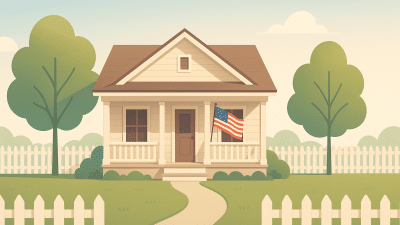We’ve all heard the phrase before, haven’t we? In fact, few phrases are repeated as often—and as confidently—as “renting is just throwing your money away.” For decades, this idea has shaped how people viewhomeownership, renting, and the path to financial security.
But is it really true? Let’s break down where this belief comes from, what the facts actually show, and how you can make the smartest choice for your situation.
Why People Believe It
The notion that “renting is throwing money away” is rooted in long-standing cultural and financial assumptions:
- Homeownership as the American Dream: For generations, owning a home has been seen as a key milestone of success and stability. Parents, financial gurus, and even government policy have promoted buying a house as a rite of passage and a wise investment.
- Equity Building: When you pay a mortgage, part of your payment goes toward building equity—ownership in your home—which many see as “saving” rather than “spending.”
- Rising Home Values: Historically, homes have appreciated in value over time, leading to the belief that buying is a surefire way to build wealth.
- Renting Seen as Temporary: Renting is often portrayed as something young people do before “settling down” with a home purchase.
Because of these beliefs, renting is sometimes unfairly characterized as paying someone else’s mortgage, with nothing to show for it at the end.
The Reality
The truth is far more nuanced. Renting is not inherently wasteful, and in many cases, it can be the smarter financial and lifestyle choice.
1. Renting Buys Flexibility and Freedom
Renters can move more easily for jobs, family, or lifestyle changes. Homeowners face closing costs, realtor fees, and the risk of market downturns if they need to sell quickly.
2. Homeownership Has Hidden Costs
Mortgage payments are just the beginning. Homeowners must also budget for property taxes, insurance, maintenance, repairs, HOA fees, and sometimes higher utility costs. According to the U.S. Bureau of Labor Statistics, homeowners spend thousands per year on maintenance and repairs alone—costs renters don’t shoulder.
3. Not All Housing Markets Appreciate Equally
While some markets see strong home value growth, others do not. If you buy in a stagnant or declining market, you may not build as much equity as expected—or could even lose money.
4. Opportunity Cost of Down Payments
The money tied up in a down payment and closing costs could potentially be invested elsewhere for a higher return, especially if you’re not planning to stay in one place for a long time.
5. Renting Isn’t “Wasted”—It’s Paying for Shelter
Just like buying groceries or paying for transportation, rent is an exchange for a service: a place to live. Homeowners also “throw away” money on interest, taxes, and maintenance—costs that don’t build equity.
6. Financial Flexibility
Renters often face lower upfront costs, freeing up money to invest, save, or pursue other goals. They’re also insulated from sudden repair bills or market downturns that can affect homeowners.
Research Backs This Up:
A 2022 study by the Urban Institute found that, depending on the market and timeframe, renting can be just as financially sound—or even better—than owning, especially for those who invest the difference between renting and owning costs.
Expert Tip
Run the Numbers for Your Situation
Financial experts agree: The best choice depends on your personal circumstances, local market conditions, and long-term goals. Use rent vs. buy calculators from reputable sources (like the New York Times or NerdWallet) to factor in all the costs—mortgage interest, taxes, maintenance, rent increases, and potential investment gains.
Certified Financial Planner Sophia Bera, CFP®, advises:
“Don’t let guilt or outdated advice push you into homeownership before you’re ready. Renting can be a smart, strategic choice—especially if you value flexibility, want to avoid unexpected costs, or aren’t sure where you’ll be in five years.”
Let’s Look At an Example
Suppose you’re considering whether to rent an apartment for $2,000 per month or buy a home priced at $400,000 with a 10% down payment.
Step 1: Gather Costs for Both Options
- Renting:
- Monthly rent: $2,000
- Renter’s insurance: $15/month
- Annual rent increases: estimate 3%
- Buying:
- Home price: $400,000
- Down payment: $40,000 (10%)
- Mortgage interest rate: 6% (30-year fixed)
- Property taxes: $4,000/year
- Homeowner’s insurance: $100/month
- Maintenance: $200/month
- HOA fees: $0 (if applicable)
- Closing costs: $8,000 (estimate)
Step 2: Use a Rent vs. Buy Calculator
Input these numbers into a reputable calculator (like NerdWallet’s Rent vs. Buy Calculator or the New York Times Rent vs. Buy Calculator).
Step 3: Factor in Opportunity Cost
Consider that the $40,000 down payment (plus closing costs) could be invested instead. Many calculators will show how investing that money, along with any monthly savings if renting is cheaper, could grow over time.
Step 4: Compare Total Costs Over Time
The calculator will project the total cost of renting versus owning over a set period (e.g., 5 or 10 years), including rent increases, home appreciation, selling costs, and investment returns on savings.
Step 5: Review the Results
- If renting costs less and investing the difference grows your wealth more than home appreciation, renting may be the better choice.
- If owning builds more equity and costs less over time, buying could make more sense.
Example Outcome:
After entering your info, the calculator might show that renting and investing the difference could leave you with more money after 7 years, especially if you’re not planning to stay in the home long-term or if home prices in your area aren’t rising rapidly
Bottom Line:
Renting is not “throwing money away.” It’s a valid, often savvy financial decision that offers flexibility, lower risk, and freedom from many hidden costs. The smartest move is the one that fits your life, your goals, and your finances—not the myths you’ve heard.





